16:12 JST, December 24, 2022
This year’s surge in anti-LGBTQ legislation, threats and protests – punctuated by the killing of five people at the gay bar Club Q in Colorado last month – has brought grief and exacerbated fear among LGBTQ Americans.
State legislators targeted gay and trans rights, while armed demonstrators threatened drag events and Pride celebrations, and children’s hospitals faced harassment organized by an anti-LGBTQ social media campaign. Politicians and influencers elevated rhetoric falsely portraying LGBTQ people as pedophiles, while school boards banned books addressing gender and sexuality.
After the shooting at Club Q, the Department of Homeland Security warned that LGBTQ people were under threat from domestic extremists. Last week, survivors of the attack testified in Congress about anti-LGBTQ violence.
Some LGBTQ people saw a positive step in the federal law protecting same-sex marriages that was signed last week. But given a broader backdrop of rising extremism and ongoing gun violence, others said this year has fractured their sense of safety. Many are grappling with a tension between protecting themselves and showing resistance; sounding the alarm and avoiding victimization; feeling fear and holding joy.
As the year comes to a close, six people talked to The Washington Post about 2022 – what the year has changed, what it hasn’t and what it means for being LGBTQ in America.
– – –
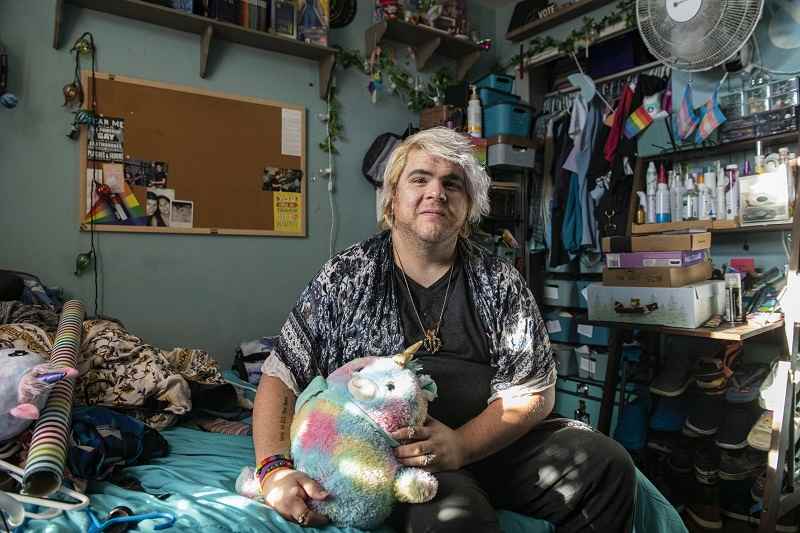
Emmanuel Cisneros, of Clifton, Colo., watches news reports, writes to lawmakers, and talks with friends about threats to the LGBTQ community. “I feel like sometimes we’re over here and we’re screaming for our lives and nobody’s listening,” Cisneros said.
Emmanuel Cisneros
When people in Emmanuel Cisneros’s conservative Colorado town see him in public wearing the glitter makeup that’s become his “personal brand,” he wants them to know one thing: They can’t put him back in the closet.
For Cisneros, 31, the “huge shift” away from progress for LGBTQ rights this year brought fear, anger and a familiar internal debate about how to react: Should he be less visibly queer in public – or more? But it also pushed Cisneros toward a clear answer.
“Before 2022 . . . I had the thought, ‘Maybe I’m being a little too much. Maybe I just need to tone it down a bit,'” said Cisneros, of Clifton, Colo., who is nonbinary and uses he/they pronouns. “But now I just feel like that voice isn’t there anymore. And [it’s] just like, put on all the glitter and all the Pride flags.”
Applying the iridescent glitter to his eyes and cheeks in the morning has become an empowering ritual. Cisneros puts it on to send a message that he exists and deserves to exist – and he hopes it might make other LGBTQ people who see him feel less alone.
Some nights, he still pauses before leaving his house, wondering whether it’s really safe to go out. The Club Q tragedy hit close to home; Cisneros went to college and came out in Colorado Springs, where the club is located. And even as he sets an example of resistance and pride for the young LGBTQ people he works with at a local homeless shelter, he worries about the potential consequences.
“I spend my entire life encouraging young people to embrace themselves and to really enjoy being who they are authentically, which in a lot of ways saves their lives. But in another way . . . it puts a very bright target on their backs,” Cisneros said. “I’m stuck with the guilt of, am I doing the right thing or am I putting them in danger? And that’s just something I’m constantly having to address in my mind.”
Cisneros tracks threats to LGBTQ rights in the news and feels an obligation to talk to their peers about what they see, even if it sometimes “feels crazy” because there are so many concerns that it’s hard to know what to focus on. Cisneros plans to keep organizing in their community, but they’re also worn down, still in survival mode after the Club Q shooting.
“For my entire life, it felt like we were going a specific direction and that we’re making progress. We were gaining rights, people were becoming more empathetic towards our right to just exist, and we achieved marriage equality,” they said. “And then, for the first time ever, it feels like there is a huge shift in direction.”
Cisneros wishes other people understood the sense of threat as keenly as they and others in their community do. At times, they feel like people in more privileged positions think they’re overreacting to what’s going on in the news.
“I feel like sometimes we’re over here and we’re screaming for our lives and nobody’s listening,” Cisneros said. “I just want people to listen.”
– – –

Zofia Janusz, a college student in Lowell, Mass., planned to come out to her extended family at Thanksgiving but changed her mind after the mass killing at Club Q in Colorado Springs
Zofia Janusz
Since the mass killing at Club Q, Zofia Janusz has stopped dyeing her hair pink. She avoids wearing bright colors or dramatic patterns. Before she goes outside, she hides her septum ring by flipping it up or donning a mask.
It’s safest, Janusz feels, if no one can guess that she’s a lesbian.
“When I dress myself in the morning I’m like, ‘Okay, I look like a queer person right now,'” said Janusz, 19, a student at University of Massachusetts at Lowell. “‘Am I okay with that?'”
That fear was less pronounced before the shooting in Colorado Springs. Janusz had worried some about the spread of anti-LGBTQ sentiment, but she was “fully out” on campus and felt comfortable discussing issues of sexuality in class. She was also open about having a girlfriend.
Now Janusz is reconsidering how visible she wants to be. She thinks twice about holding hands with her girlfriend in public or attending LGBTQ-focused events on campus, worried about attracting the wrong kind of attention. Plans made before the Club Q shooting to visit a gay bar in Boston no longer feel safe.
Janusz also nixed plans to come out to her extended family at Thanksgiving, days after the Colorado attack. She had seen the shooting suspect’s father suggest in an interview that he was more worried about his son being gay than about him being a suspected shooter. The father said he identifies as politically conservative, just like the family members Janusz was going to spend the holiday with. Suddenly, she didn’t want to broach the subject of her sexuality.
But being less visibly queer is complicated for Janusz. She knows there are a lot of LGBTQ people publicly demanding acceptance and refusing to be silenced. She wants to fight alongside them, but it feels too dangerous.
“Then attached to that fear is the guilt that comes with it, because ‘you have to be brave’ or something,” Janusz said. “But I don’t know that I want to be brave right now. I kind of want to just keep being alive.”
– – –
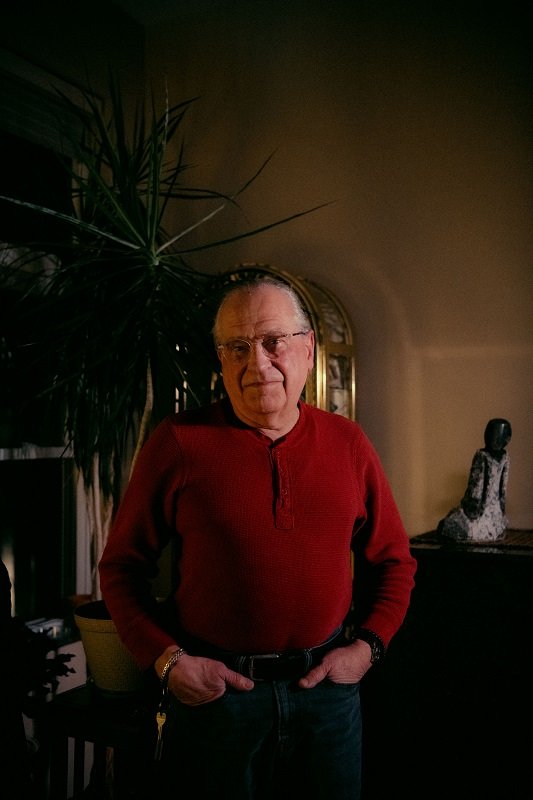
Tom Spinella, 73, feels optimistic about the future of LGBTQ rights but also concerned about a newly emboldened generation of extremists
Tom Spinella
Tom Spinella remembers going to shabby, hidden places to find other LGBTQ people when he was young. In the 1970s and early ’80s, he and his friends often had to meet in “not-very-uplifting places,” he recalled.
Today, he sees progress represented in the very existence of the Chicago LGBTQ community center where he works – a clean, well-lit, properly funded space where he works at a front desk and welcomes anyone seeking help.
It’s among the reasons Spinella, 73, feels “very optimistic” about the future. He was moved, too, by President Biden’s signing last week of the Respect for Marriage Act protecting same-sex marriage, capped by Cyndi Lauper’s performance of “True Colors.”
“It’s a fight with the boneheads,” Spinella recalled thinking as he watched a broadcast of Lauper performing at the White House ceremony, “but we have come out on top again.”
Yet simultaneously, the alarm he feels in 2022 is more serious than any he has felt before. He has found himself depending more on his daily meditation practice. He has lost a sense of political safety, and he feels grief thinking about the growing number of people in his community who are “vulnerable and scared.”
Spinella has also become more aware of who’s walking through the door of the community center, which has protocols in place for a shooter or an evacuation. But he tries to focus on his mission to help people.
“The aspect of the threat involved, I kind of just work through that to do my job,” he said. “I don’t try to get alarmist about somebody walking in with a gun. I try not to let that in.”
Spinella charges former president Donald Trump with emboldening a new generation of extremists.
“They’re not looking to get along with you or compromise with you or negotiate with you. They want you dead. . . . Now they are enabled, they are alibied, they are weaponized,” said Spinella, who is bisexual.
“It’s like warfare. They’re lurking, they’re lurking, ready to charge, regrouping. And what do you do? You just keep doing the work you’re doing.”
– – –
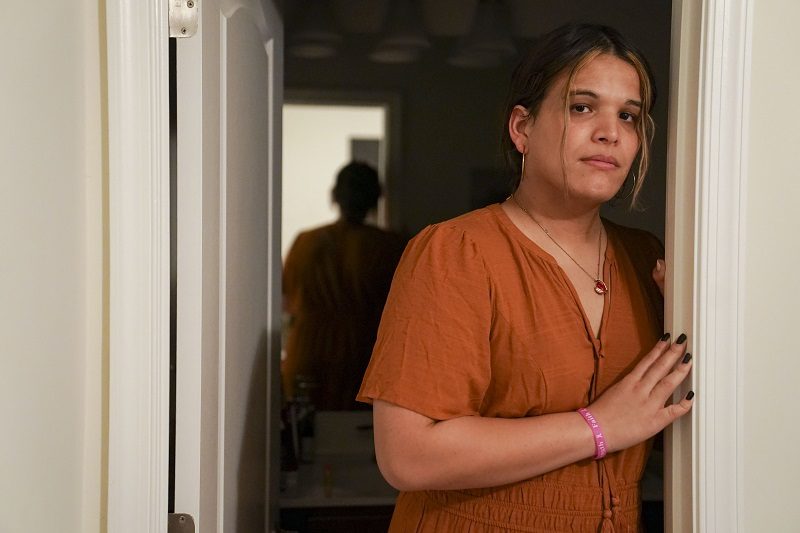
As a trans woman, Eden Villamarin fears the national atmosphere of hostility to LGBTQ people won’t let her pursue her passion for teaching.
Eden Villamarin
Eden Villamarin notices skeptical looks from some students when she goes to work as a substitute teacher.
She has long wanted to be an educator, inspired by a high school teacher who supported her at a hard time and the chance to be a positive role model. But as a transgender woman who thinks she doesn’t “pass” as female, she also fears that simply existing as herself in a classroom could spell danger.
Villamarin worries that other states could mimic Florida’s law limiting lessons on gender and sexuality, making it impossible to teach students about historical figures who share her experiences. She fears angry parents physically attacking her or maligning her on social media. Since coming out, she said, she has already lost a job teaching swim lessons.
Living in Stafford, Va., she’s particularly worried by Republican Gov. Glenn Youngkin’s moves to severely restrict transgender students’ rights.
“It makes it hard to do almost anything,” Villamarin, 23, said of the nationwide uptick in anti-trans legislation and rhetoric. “There is a part of me that regrets ever coming out.”
The anxiety is relatively new to Villamarin, who started opening up about her gender last year after a trip to the emergency room. Seeing so many seriously ill people at the hospital, she felt an epiphany: If she were to die before sharing who she really is, it would mean losing not only the person she had been presenting to the world, but also the person she truly is inside.
Coming out, she felt relief and euphoria. Since then, though, her own experiences and the national atmosphere have made her fear that she may not be able to pursue her dream career. With districts across the country embroiled in controversy over trans students in sports or acknowledging LGBTQ people in curriculums, Villamarin said she worries that she would be under siege even in a more liberal area. She’s terrified when she goes outside in women’s clothing, she said, and entering schools in those clothes feels even scarier.
But Villamarin said she’s also motivated by wanting to support students who are struggling with their own identities. At the end of her life, she said, she wants to know that she helped young people as much as she could.
“If something was to happen to me, I don’t want to live with that regret of, ‘I stood back and let it happen,'” she said. “I want to say that I was able to go out there and try.”
The climate of fear also spurred Villamarin to action. This year, she cast a vote in an election for the first time – with protecting herself against anti-trans threats and attacks at the top of her mind.
The stakes, she said, were too high to let the opportunity pass by.
– – –
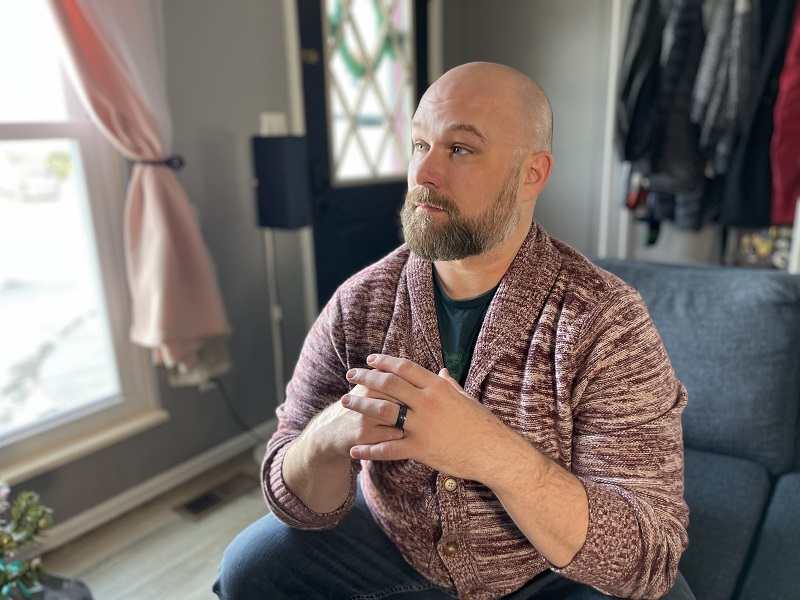
Josh Wittge, 39, and his husband moved to Aurora, Colo., this month out of fear that Texas, where they had been living, could someday refuse to recognize same-sex marriages.
Josh Wittge
Two weeks ago, Josh Wittge and his husband drove away from Austin. They crossed the panhandle’s barren miles, passed state lines, and arrived in the Denver suburbs.
The couple had been married quickly in California in 2018, fearful of losing the right after conservative Justice Brett M. Kavanaugh’s confirmation to the Supreme Court. Now, they were uprooting their lives and moving 900 miles to ensure their marriage would be protected.
“We needed to get to a state where, in a world where Obergefell was overturned, we would have our rights recognized,” Wittge said, referring to the 2015 Supreme Court case that guaranteed marriage equality.
Wittge, 39, and his husband started talking about leaving Texas in June, after the overturning of Roe v. Wade eliminated constitutional protections for abortion. That decision raised alarm among many that the majority-conservative court could use the same arguments to end protections for same-sex unions. If that were to happen, the couple didn’t want to be in Texas, where same-sex marriage had been banned before 2015.
2022 had brought other safety concerns, too. A few months earlier, the couple had watched Texas Gov. Greg Abbott (R) order state workers to investigate parents of trans children. They were horrified by a 2021 law allowing most Texans to openly carry guns without permits, followed by the shooting at an elementary school in Uvalde, Tex., in May. They’d started wondering whether they needed to own a gun and what would happen if a shooter targeted one of the gay bars they frequented.
So they made a list of 10 cities. They started looking for jobs. They told their families they planned to leave Texas. By September, Wittge had arranged to relocate with his employer, and they had chosen the Denver area.
In the end, leaving felt empowering, Wittge said. Since arriving in Aurora, Colo., he feels like he’s on firmer ground. He hopes that sense of safety will give him more energy to push for change as an activist. He plans to join the drag performance scene and find community organizations to work with.
Wittge and his husband hope to eventually move to an even more liberal area in the Pacific Northwest, but they feel politically safer in Colorado than in Texas and have been comforted by seeing a higher level of LGBTQ visibility in Denver, Wittge said.
He also thought their move might open acquaintances’ eyes about the threat their community is feeling.
“What I’m hoping is there’s a degree of impact on my social groups – like, I am changing my life because it is this bad,” Wittge said.
Wittge sees a connection between rising anti-LGBTQ sentiment and the rest of the political climate, including far-right extremism, racism and antisemitism, gun violence, and the overturning of Roe. He sees attacks on gay and trans rights as warning signs that fascism is on the rise, and he wants more people who aren’t worried about their own rights to start speaking up for others.
“It’s about seeing it as an ‘us’ problem, as in capital-U ‘Us,’ all of us. Human lives are at stake,” Wittge said. “The question I would ask to anybody: What’s going to be the line that has to be crossed for you to believe, ‘Oh, it’s kind of bad and I should pay attention’?”
– – –
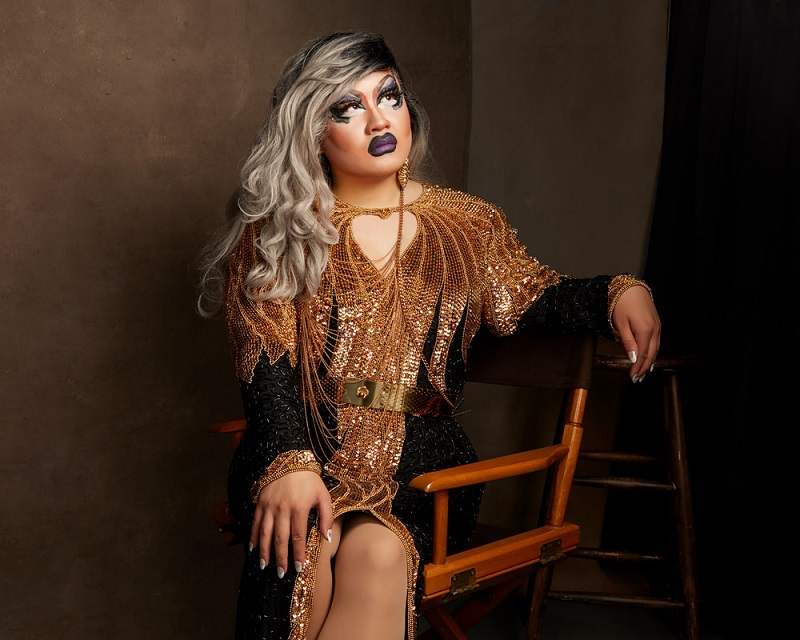
Panda Dulce, of the San Francisco Bay area, was about to read to children at Drag Queen Story Hour in June when members of the Proud Boys stormed the event. The experience made her seek out ways to protect herself.
Panda Dulce
After members of the Proud Boys stormed her Drag Queen Story Hour in June, Panda Dulce bought a baseball bat. Supporters gave her pepper spray. She took a martial arts class.
Dulce, who identifies as bigender, wasn’t taking any chances as she faced a barrage of death threats. The far-right extremists bursting into the San Lorenzo, Calif., library and shouting anti-trans and anti-gay insults had traumatized her enough.
Little has been the same for her since then.
“I definitely don’t move through the world the same way I did before,” said Dulce, 34, who spoke with The Post on the condition that only her stage name be used because she feared for her safety.
Since the incident, Dulce has started traveling to venues with other drag artists for protection. She changed her passwords in case someone tried to hack into her online accounts. She couldn’t sleep for months, with every noise in her home driving her to lunge for the bat near her bed.
Suddenly in the spotlight, it felt as if every aspect of Dulce’s life were being picked apart by people determined to prove she was a threat to what they view as the nation’s traditional culture. She started scrutinizing everything she said, even when she wasn’t in public.
Dulce believes systemic change is necessary to combat extremists, and the experience underscored her lack of faith in the legal system. She sees it as designed to protect the perpetrators of hate crimes, rather than the victims.
So, recently, she went to a shooting range to learn how to protect herself. She was comforted by the fact that a fellow queer person of color taught her how to fire. But Dulce hated the feeling that she had to pick up a gun to feel safe amid the violence directed at her.
“Even the measures you take to be safe, you have to immerse yourself in this weird, paranoid world,” she said.
Despite the stress, Dulce refuses to hide. She’s still performing, she said, while she and members of her LGBTQ community work to protect one another.
“We’re not just passively awaiting violence,” Dulce said. “We’ve had to be resilient before, and we have the skills.”
Top Articles in News Services
-

Survey Shows False Election Info Perceived as True
-

Prudential Life Expected to Face Inspection over Fraud
-

Hong Kong Ex-Publisher Jimmy Lai’s Sentence Raises International Outcry as China Defends It
-

Japan’s Nikkei Stock Average Touches 58,000 as Yen, Jgbs Rally on Election Fallout (UPDATE 1)
-

Japan’s Nikkei Stock Average Falls as US-Iran Tensions Unsettle Investors (UPDATE 1)
JN ACCESS RANKING
-

Japan PM Takaichi’s Cabinet Resigns en Masse
-

Japan Institute to Use Domestic Commercial Optical Lattice Clock to Set Japan Standard Time
-

Israeli Ambassador to Japan Speaks about Japan’s Role in the Reconstruction of Gaza
-

Man Infected with Measles Reportedly Dined at Restaurant in Tokyo Station
-

Videos Plagiarized, Reposted with False Subtitles Claiming ‘Ryukyu Belongs to China’; Anti-China False Information Also Posted in Japan
























